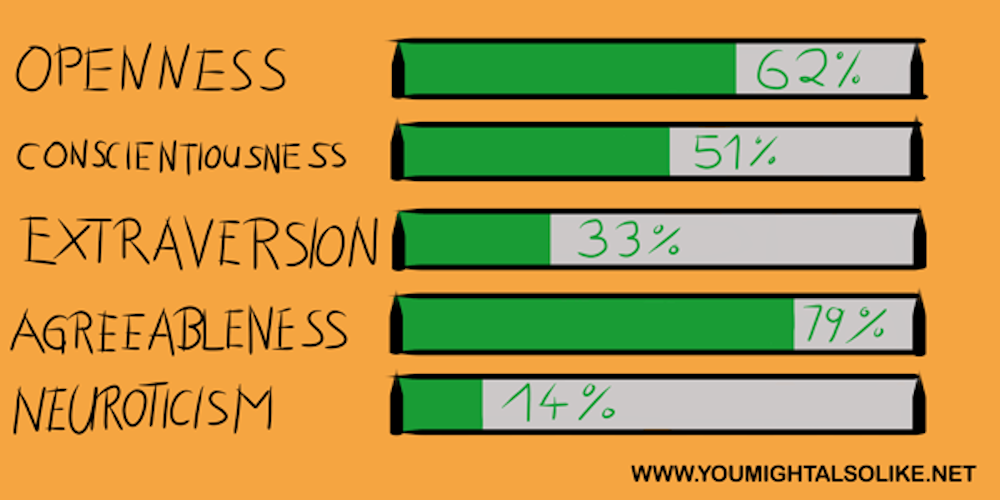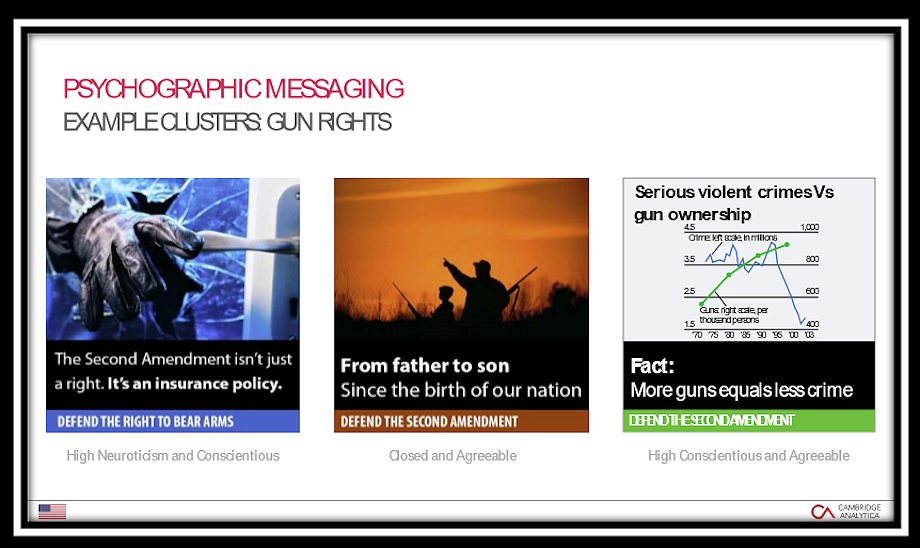If you’re reading this, data is being collected on you. It’s a fact of life on the internet. The handful of data companies I’ve talked to claim to own 5,000 pieces of data on nearly every American adult. (Can you even come up with 5,000 things about yourself?)
One such data marketer, Cambridge Analytica, has floated up in various news cycles recently, much of it having to do with its affiliation with the Trump campaign and musings about its impact on the 2016 election. Now Facebook claims that it illegally harvested data.
I had some insight into Cambridge’s micro-targeting methods from a lengthy interview I did with CEO Alexander Nix during the presidential primaries. CA does political (and consumer) marketing. Robert Mercer reportedly had a $10 million stake in it. It was used by the Cruz, Carson and Trump campaigns.

This is Cambridge Analytica’s OCEAN personality assessment.
Here’s how it works.
CA’s metric scales (pictured above) sorts people via psychographics rather than the usual demographics.
Which means they’re measuring your personality online: harvested daily from every online source: your “likes,” associations, quiz answers, responses to polls etc.
Those items — the algorithm writers believe — reflect your behavior, your personality your beliefs — and what you’re likely to do next, aka predictive analytics.
CA’s OCEAN assessment distills us into scales of openness, conscientiousness, extraversion, agreeableness and neuroticism. It’s loosely based on Myers-Briggs, according to Nix.
Below is an example of the messaging you’d be getting had you been mulling the second amendment. This was a CA ad series created by Cambridge Analytics sent by the Cruz campaign.

The (center) closed-minded, but agreeable sort would get a father and son traditionalist sentiment.
The highly conscientious person (right) gets statistics to back up their belief system.
But the poor soul scoring high on neuroticism (left) gets the ominous black gloved hand breaking glass to get into your space.
This is what Cambridge Analytica showed me. Any journalist then wonders, imagine what they’re not showing me.
The endgame for all this trouble is to move your most persuadable people through the so-called sales funnel to vote. (Or buy something.)
The software is constantly looking for patterns in the data, to predict what you will do next. If you buy a Volvo, you are likely to vote for X. There are many levels to this. (And some marketers will see this and say so what?)
It then send ads that are visible during your most active buying times with the perfect message, colors, sentiment, visual graphic to move you.
Is it effective? It obviously didn’t work for Cruz or Carson and Trump’s digital director Brad Parscale told 60 Minutes’ Leslie Stahl he didn’t use it …because it didn’t work. CA, on its website took credit for helping Trump win.
Cambridge Analytica is a subsidiary of SCL Group, which claims to influence elections around the world. They boasted to me that their clientele consisted of Britain’s MI-6 and the US State Department. (The State Department has since asked Cambridge Analytica to remove that affiliation from its website.) This news was shocking to me at first. But now I’m not sure if I can be shocked anymore.
Micro-targeting is not new. Obama used it effectively and many political campaigns have a digital operation that uses geo-data, voting records and other forms of data available and for sale. Micro targeting is also used to sell cars and vitamins and furniture. The difference is this idea of targeting personalities. Politics is personal, emotional and goes to our core belief system. Using psychological manipulation seems quite like dirty pool. People do bristle at that.
This psy-ops aspect of this may be novel and perhaps not terribly effective yet. But as Cathy O’Neil, author of “Weapons of Math Destruction” recently said in an interview, “Give them time.”




